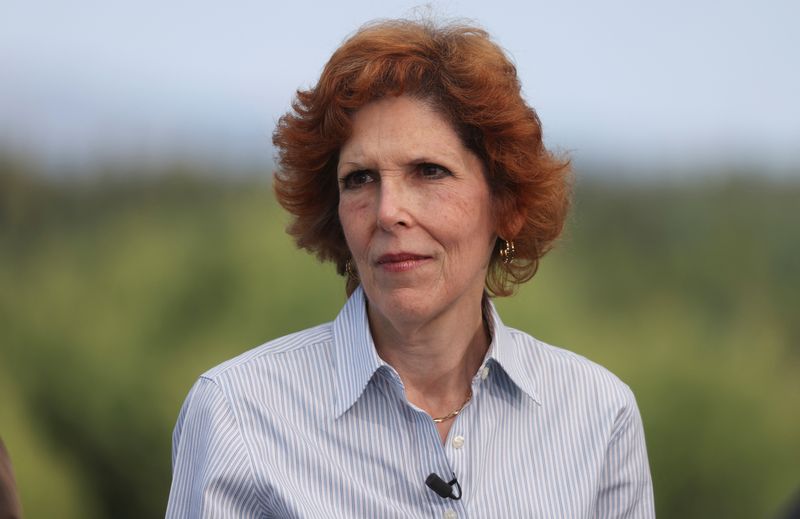Fed’s Mester: Doesn’t see financial stability problems for US
2022.09.29 11:36
[ad_1]

© Reuters. Loretta J. Mester, president and CEO of the Federal Reserve Bank of Cleveland, looks on at Teton National Park where financial leaders from around the world gathered for the Jackson Hole Economic Symposium outside Jackson, Wyoming, U.S., August 26, 2022.
By Michael S. Derby
(Reuters) -Federal Reserve Bank of Cleveland President Loretta Mester said Thursday she does not see distress in U.S. financial markets that would alter the central bank’s campaign to lower very high levels of inflation through interest rate hikes.
While “no one knows for sure” if there is a big problem lurking in the financial sector right now, “so far, we haven’t seen the kind of market dysfunction, even through what’s happening in the global markets right now, we haven’t seen that in the U.S. markets,” Mester said in an interview on CNBC.
Mester touched on market conditions amid very unsettled conditions across the globe. She acknowledged that Bank of England actions this week to buy bonds to stabilize markets there appeared at odds with its work to lower inflation.
The BoE’s actions appeared “a little bit incoherent because they were buying bonds at the same time they’re talking about raising interest rates,” Mester said. But she added there were “good reasons” for what the UK central bank did, saying “market functioning is incredibly important, because you won’t be able to hit any monetary policy goals if the markets aren’t functioning.”
Mester, who holds a voting role on the rate setting Federal Open Market Committee, said she still sees inflation as the paramount problem facing the economy, which means the central bank needs to press forward with rate rises, lifting a federal funds target rate range now at between 3.00%-3.25% to over 4%.
The Fed has faced concerns that its aggressive rate hikes aimed at lowering inflation from 40-year highs will send the economy into recession. Financial markets have also been under broad pressure and suffered steep losses, and many observers worry Fed actions, coupled with rate rises from other major central banks, could trigger market dysfunction.
Mester said she does not see a case for slowing down on rate rises right now. She noted that at last week’s FOMC meeting officials penciled in a path for the federal funds target rate that will get it to 4.6% next year and said she expects the central bank will likely have to go further than that.
“I probably am a little bit above that median path because I see more persistence in the inflation process,” Mester said. Getting above a 4% fed funds rate is important to helping to lower inflation, she said.
Mester also said job market demand continues to outpace supply. She also said the strong dollar is a helpful force to lower U.S. inflation.
The central banker also cautioned against taking too much signal from data showing a decline in the nation’s money supply. Some see the drop as a sign that future inflation levels will fall.
“Money supply hasn’t been that reliable an indicator for a long time,” Mester said. Measurements of the money stock are “not figuring into my calculus at the moment.”
[ad_2]
Source link








